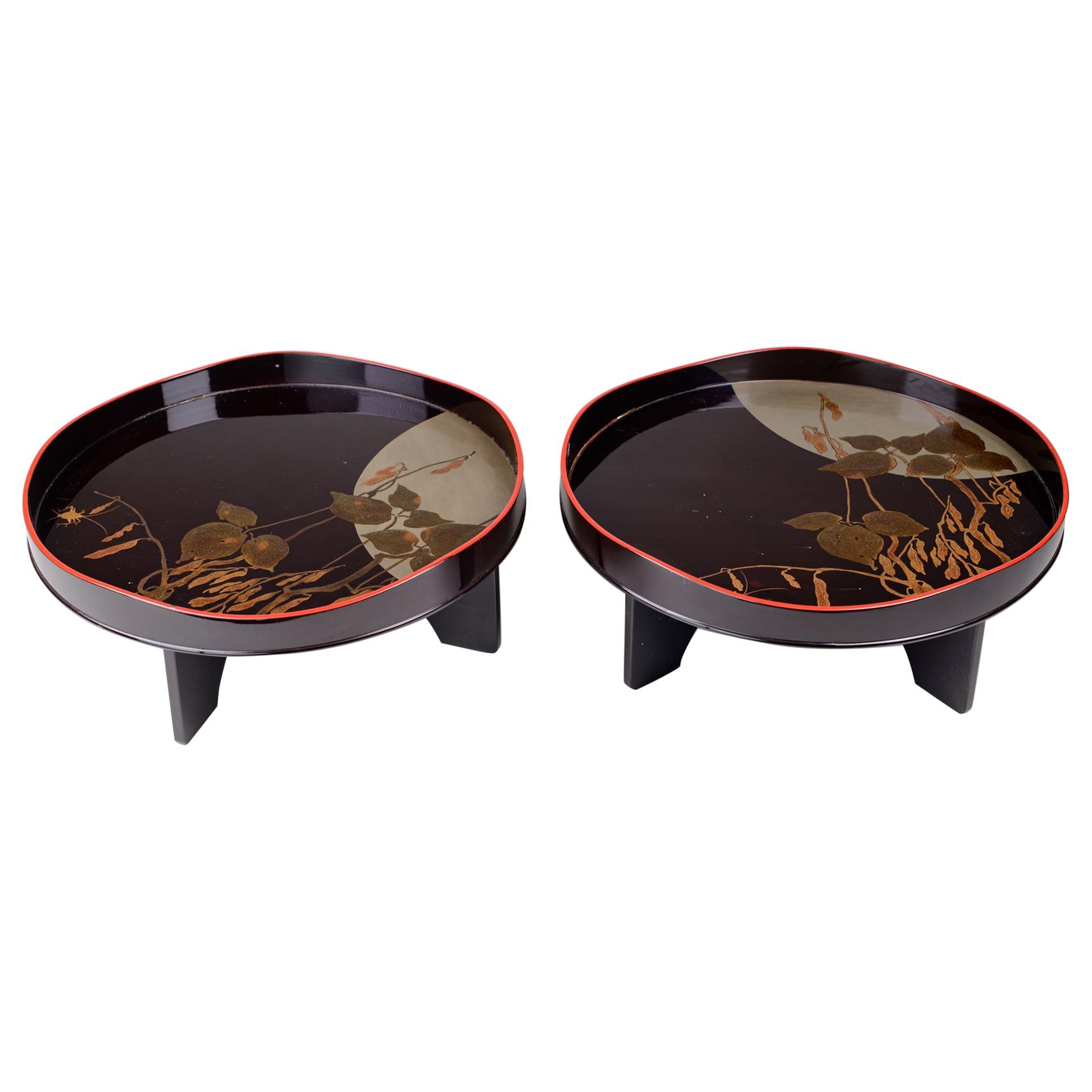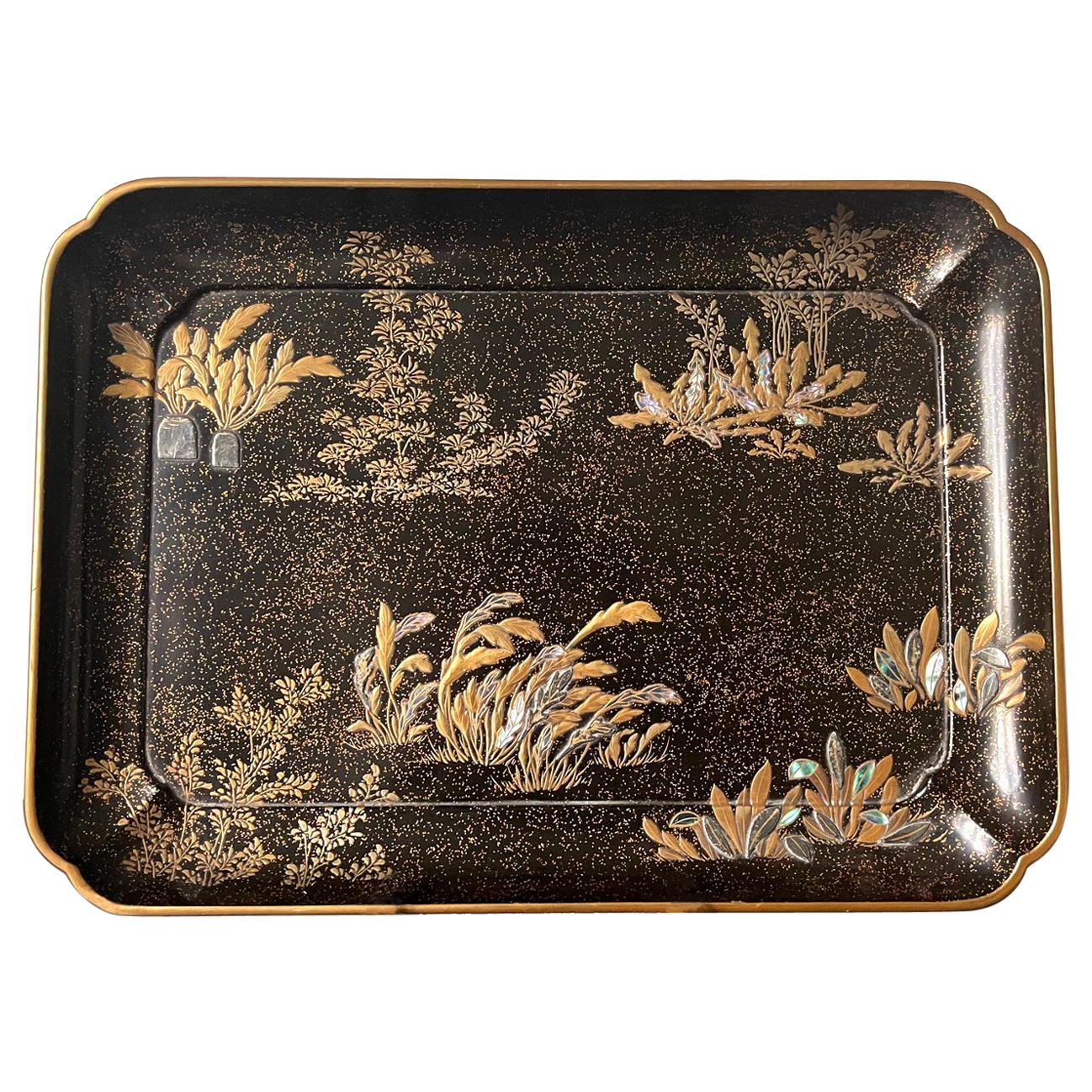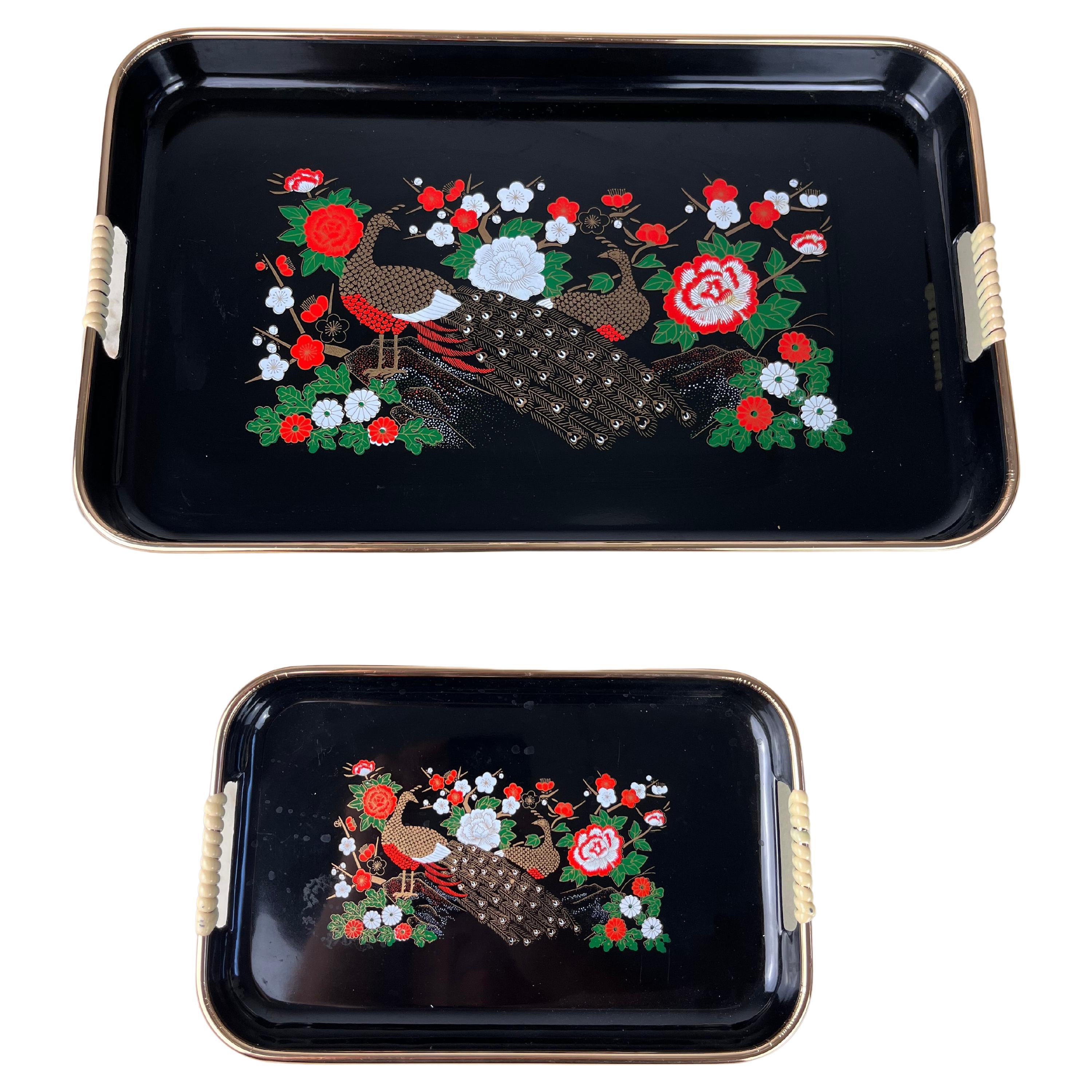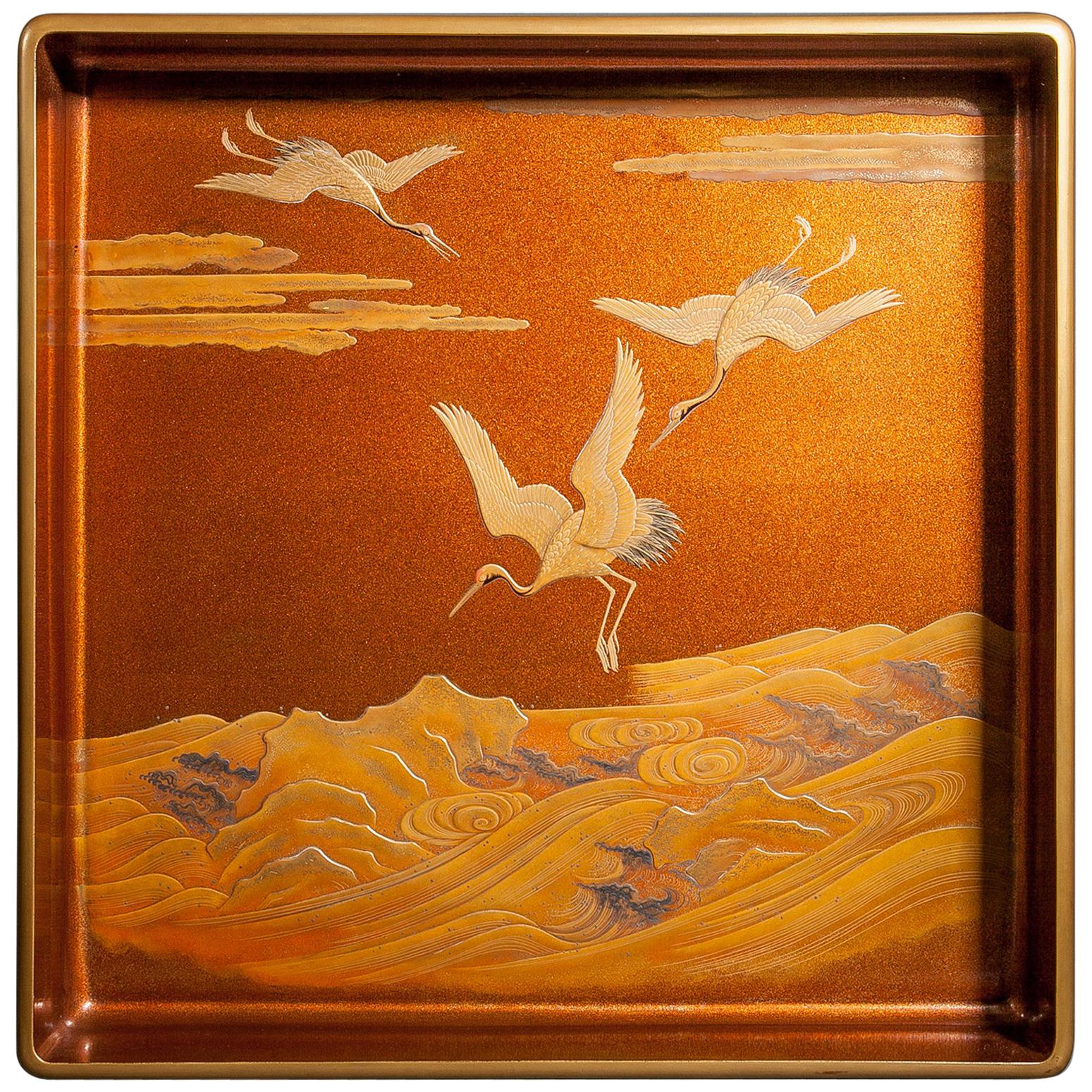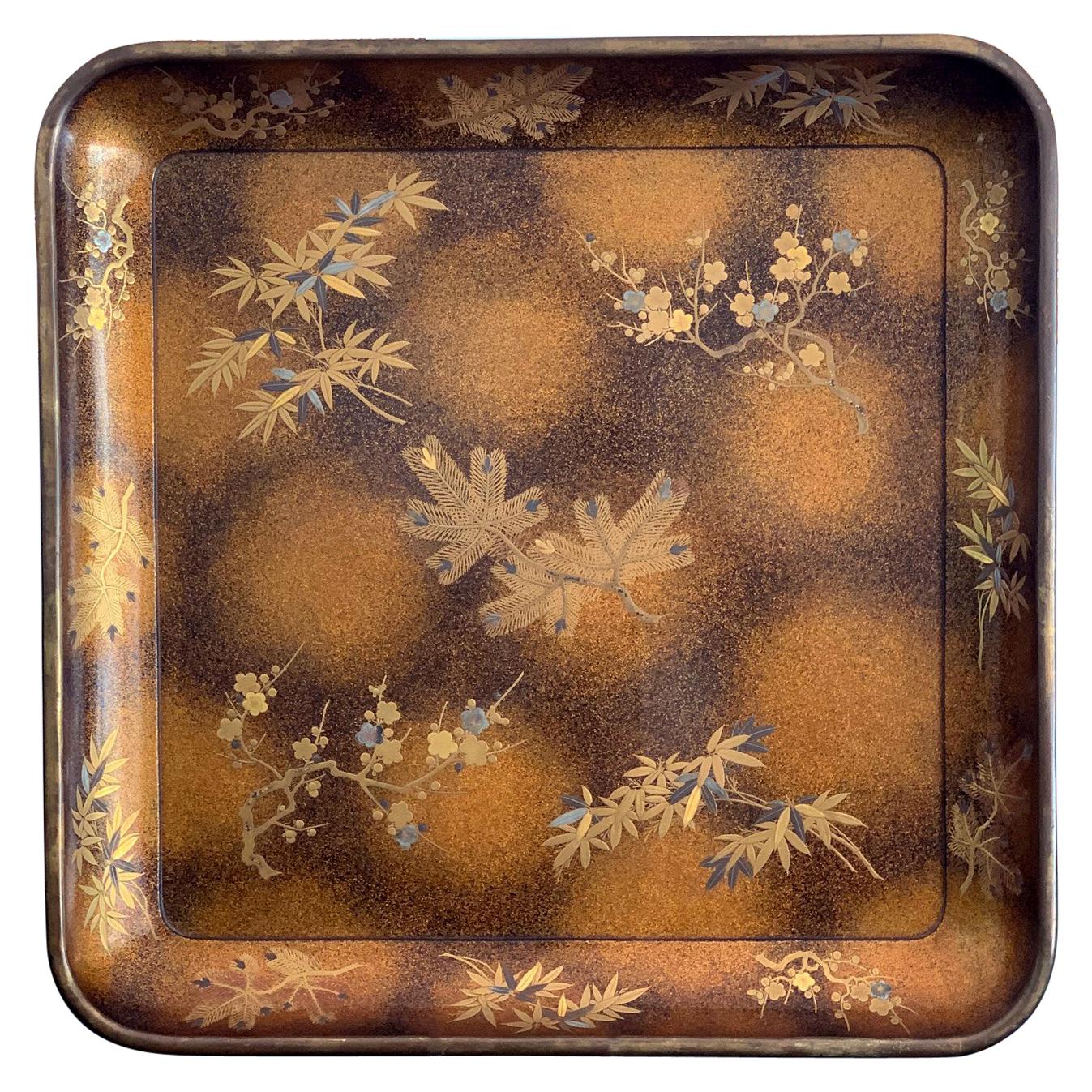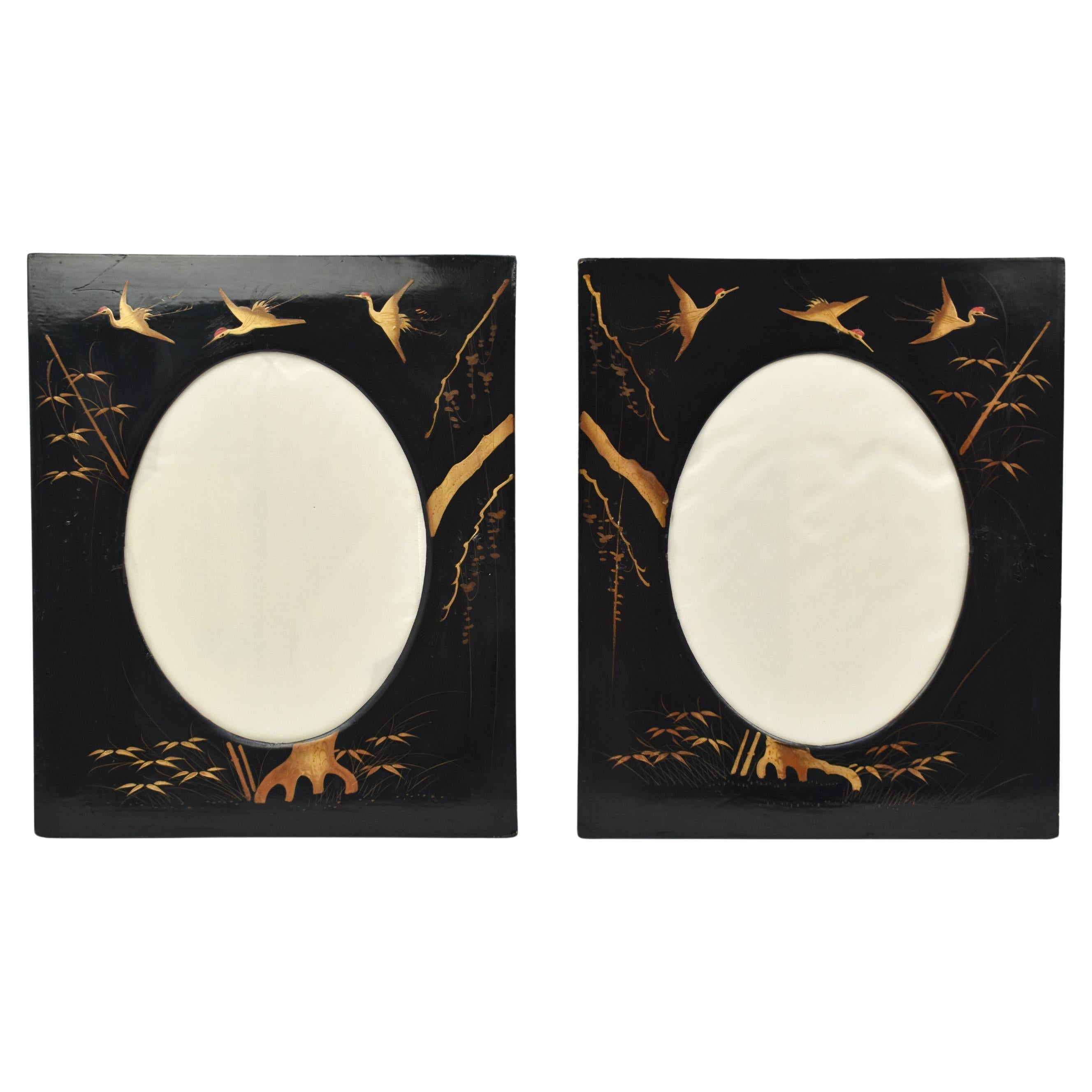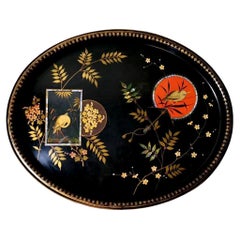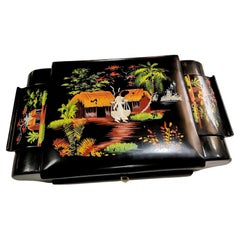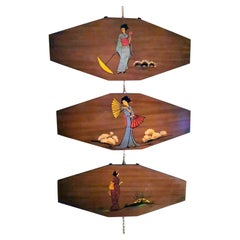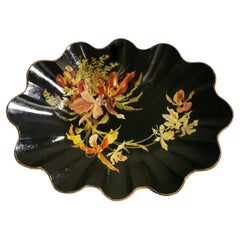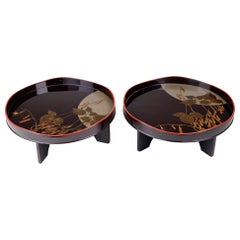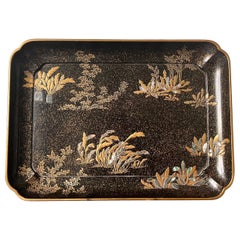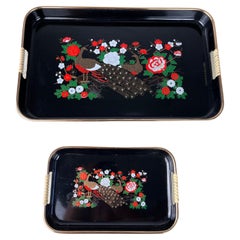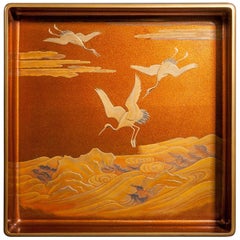Items Similar to Japanese Maki Style Black Lacquer Effect Resin Two Trays Gold Painted Cranes
Want more images or videos?
Request additional images or videos from the seller
1 of 21
Japanese Maki Style Black Lacquer Effect Resin Two Trays Gold Painted Cranes
$982.15per set
£727.82per set
€820per set
CA$1,340.82per set
A$1,491.60per set
CHF 781.92per set
MX$18,227.03per set
NOK 9,956.74per set
SEK 9,372.90per set
DKK 6,243.41per set
Shipping
Retrieving quote...The 1stDibs Promise:
Authenticity Guarantee,
Money-Back Guarantee,
24-Hour Cancellation
About the Item
We kindly invite you to read the full description, as we aim to provide detailed technical and historical information to ensure the authenticity of our pieces.
Unusual and refined pair of rectangular trays in two different sizes, crafted in black resin with a lacquer-effect finish. Each piece is entirely hand-painted with remarkable precision and skill: the artist meticulously rendered even the finest details—note the feathering of the wings and the legs—depicting two graceful cranes in flight in shimmering gold paint. The painting was executed using the Maki-e technique, an ancient Japanese lacquer art form. A stylized red ideogram representing the word “Tsuru” (crane) is also painted on each tray. The handles are seamlessly integrated into the short sides, and the entire upper rim is accented with gold. The result is a clean, elegant design that is also highly practical and functional. These pieces were made in Japan between 1960 and 1964 in the city of Wajima, on the Noto Peninsula—an area renowned for its lacquerware and similar materials. Beyond their aesthetic appeal, these trays carry a rich symbolic meaning. The crane, with its slender legs, pure white feathers, and signature red crown, is one of the most revered symbols in Japanese culture. It represents loyalty, honor, and strength—values that led the samurai class to use its image on their armor and weapons. The crane’s black, white, and red plumage also evokes purity and beauty, concepts reflected in the traditional makeup of the Geisha. Cranes are monogamous and known for their lifelong pair bonds, making them a meaningful gift for couples, especially newlyweds, symbolizing a long and happy life together. According to legend, folding 1,000 origami cranes will grant a heartfelt wish. This belief is deeply connected to the story of Sadako Sasaki (January 7, 1943 – October 25, 1955), a young girl who became a symbol of peace in post-war Japan. Sadako was only two years old when the atomic bomb was dropped. She appeared unharmed, but ten years later, at age twelve, she was diagnosed with leukemia caused by radiation exposure. Inspired by the legend, she began folding cranes in hopes that her wish to live would come true. She created hundreds of them—each a delicate, colorful masterpiece. Day after day, from her hospital bed, she folded with determination. Tragically, her illness progressed, and she passed away in October of that same year. Her story deeply moved the Japanese people. In her honor, a statue was erected in Seattle’s Peace Park (USA), where visitors still leave garlands of origami cranes as a symbol of peace and hope. Sadako and her cranes have since become powerful symbols of peace around the world. The trays are in good overall condition. Dimensions:– Large tray: 49 cm W x 31 cm D x 5 cm H – Small tray: 43 cm W x 29 cm D x 5 cm H
For all our shipments, we use custom packaging materials—wooden crates, polystyrene, and other protective elements—to ensure the utmost care and safety during transport.
- Dimensions:Height: 1.97 in (5 cm)Width: 19.3 in (49 cm)Depth: 12.21 in (31 cm)
- Sold As:Set of 2
- Style:Japonisme (In the Style Of)
- Materials and Techniques:Resin,Hand-Painted
- Place of Origin:
- Period:
- Date of Manufacture:1960-1964
- Condition:Wear consistent with age and use. The trays are in good overall condition.
- Seller Location:Prato, IT
- Reference Number:Seller: 175791stDibs: LU4632244518102
About the Seller
5.0
Platinum Seller
Premium sellers with a 4.7+ rating and 24-hour response times
Established in 1977
1stDibs seller since 2019
284 sales on 1stDibs
Typical response time: <1 hour
- ShippingRetrieving quote...Shipping from: PRATO, Italy
- Return Policy
Authenticity Guarantee
In the unlikely event there’s an issue with an item’s authenticity, contact us within 1 year for a full refund. DetailsMoney-Back Guarantee
If your item is not as described, is damaged in transit, or does not arrive, contact us within 7 days for a full refund. Details24-Hour Cancellation
You have a 24-hour grace period in which to reconsider your purchase, with no questions asked.Vetted Professional Sellers
Our world-class sellers must adhere to strict standards for service and quality, maintaining the integrity of our listings.Price-Match Guarantee
If you find that a seller listed the same item for a lower price elsewhere, we’ll match it.Trusted Global Delivery
Our best-in-class carrier network provides specialized shipping options worldwide, including custom delivery.More From This Seller
View AllNapoleon III Style French "Chinoserie" Hand-Painted Metal Tray
Located in Prato, Tuscany
We kindly suggest that you read the entire description, as with it we try to give you detailed technical and historical information to ensure the authenticity of our objects.
Origina...
Category
Antique Late 19th Century French Napoleon III Platters and Serveware
Materials
Iron
Chinese Lacquer Hand-Painted Toiletry Box with Mirror
Located in Prato, Tuscany
We kindly suggest you read the whole description, because with it we try to give you detailed technical and historical information to guarantee the authenticity of our objects.
Valua...
Category
Mid-20th Century Chinese Chinoiserie Lacquer
Materials
Wood
Teak Wood Decorative Panels with Japanese Kimono Figures
Located in Prato, Tuscany
We kindly suggest you read the whole description, because with it we try to give you detailed technical and historical information to guarantee the authenticity of our objects.
Series of three decorative panels made of teak hardwood; they have a pleasing elongated hexagon shape; on each one is depicted a Japanese woman wearing a Kimono; they have an attachment so they can be arranged on the wall in a personal way. They were produced in Denmark between 1960 and 1965. The top one (see photo) and the bottom one present the "Furisode" Kimono, while the middle one is the Uchikake Kimono...
Category
Mid-20th Century Danish Chinoiserie Decorative Art
Materials
Teak
Napoleon III Chinoserie French Lobed Basket In Hand-Decorated Papier-Maché
Located in Prato, Tuscany
We kindly suggest you read the whole description, because with it we try to give you detailed technical and historical information to guarantee the authenticity of our objects.
Valua...
Category
Antique Mid-19th Century French Chinoiserie Lacquer
Materials
Paper
Italian Black Glass Sofa Table, Oriental Decorations, Mod. Rene
Located in Prato, Tuscany
We kindly suggest you read the entire description, as it provides detailed technical and historical information to ensure the authenticity of our objects.
A peculiar and original sof...
Category
Mid-20th Century Italian Chinese Export Sofa Tables
Materials
Brass
Qing Dynasty Exquisite Chinese Wooden Panel With Raised Figures Gold Leaf (n.2)
Located in Prato, Tuscany
We kindly invite you to read the entire description carefully, as we aim to provide detailed technical and historical information to ensure the authenticity of our items.
This extrao...
Category
Antique Late 19th Century Chinese Chinoiserie Sculptures and Carvings
Materials
Wood
You May Also Like
Pair of Antique Japanese Lacquer Trays
Located in Hudson, NY
Pair of antique Japanese Lacquer Trays, Taisho period (1912-1926) beautifully decorated with a miniature landscape of pea pods on the vine and a gold cricket set...
Category
Vintage 1920s Japanese Taisho Lacquer
Materials
Lacquer
$2,500 / set
Japanese Lacquer Tray with Maki-e and Inlay Hara Yoyusai Edo Period
Located in Atlanta, GA
A lovely Japanese lacquer rectangular lacquer tray with a slightly scalloped corner and four L shape supporting feet by one of the most celebrated lacquer artist active in Edo period Hara Yoyusai (1772-1845). Yoyusai lived in Edo (Tokyo) and worked under the patronage of Lord Matsudaira. He operated a large workshop and had a very prolific output of lacquer objects. Most survived pieces being inro...
Category
Antique 19th Century Japanese Japonisme Lacquer
Materials
Wood, Lacquer
Pair of Vintage Oriental Trays, Japan, 1970s
Located in Palermo, IT
Pair of vintage oriental trays, Japan, 1970s
Found in a noble apartment, they are intact and in good condition. Small signs of aging. The largest measures 42.5 cm x 26.5 cm x 3.5 cm;...
Category
Vintage 1970s Japanese Tray Tables
Materials
Plastic
$210 Sale Price / set
37% Off
Japanese Nashiji Lacquer Tray with Crane and Wave Design
Located in Hudson, NY
Japanese Nashiji lacquer tray with crane and wave design, this exquisite tray is a masterful example of multiple lacquer techniques using gold (including maki-e and takamaki-e). This...
Category
Antique Late 19th Century Japanese Meiji Lacquer
Materials
Gold
Large Vintage Japanese Maki-e Lacquer Kimono Tray
Located in Atlanta, GA
A large square lacquer presentation tray (likely for kimono) predated 1950 of the Showa period. Elaborately decorated with Maki-e that depicts the prunus blossom, bamboo and needle p...
Category
Vintage 1940s Japanese Japonisme Lacquer
Materials
Wood, Lacquer
1920s Japanese Black Lacquer Picutre Frames
Located in AMSTERDAM, NL
Set of two 1920s Japanese black lacquer picture frames. These frames are made from wood, and are decorated with gold crane birds and reeds. Inside is a white satin backdrop, and glas...
Category
Vintage 1920s Japanese Chinoiserie Picture Frames
Materials
Glass, Wood
More Ways To Browse
White Lacquer Furniture
Vintage Black Lacquer
Mid Century Black Lacquer
Black Japanned Furniture
Black Gold Lacquer
Black And Red Lacquer
Resin Legs
Vintage Painted Trays
Vintage Japanese Lacquer
Two Cranes
Large Black Tray
Japanese Crane
Asian Cranes
Seattle Furniture
Japanese Samurai Art
Black And Gold Tray
Gold Cranes
Day Bed Used
